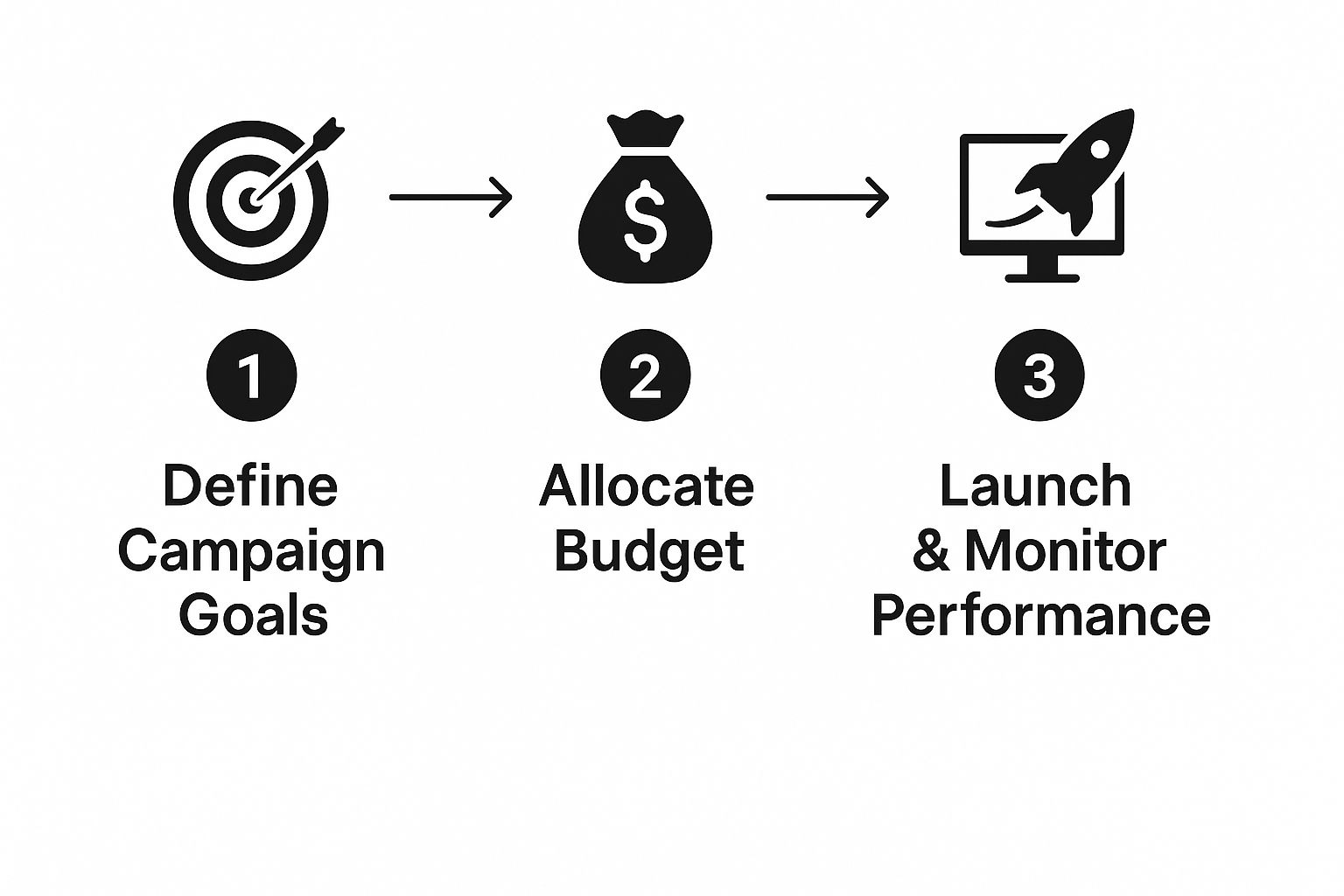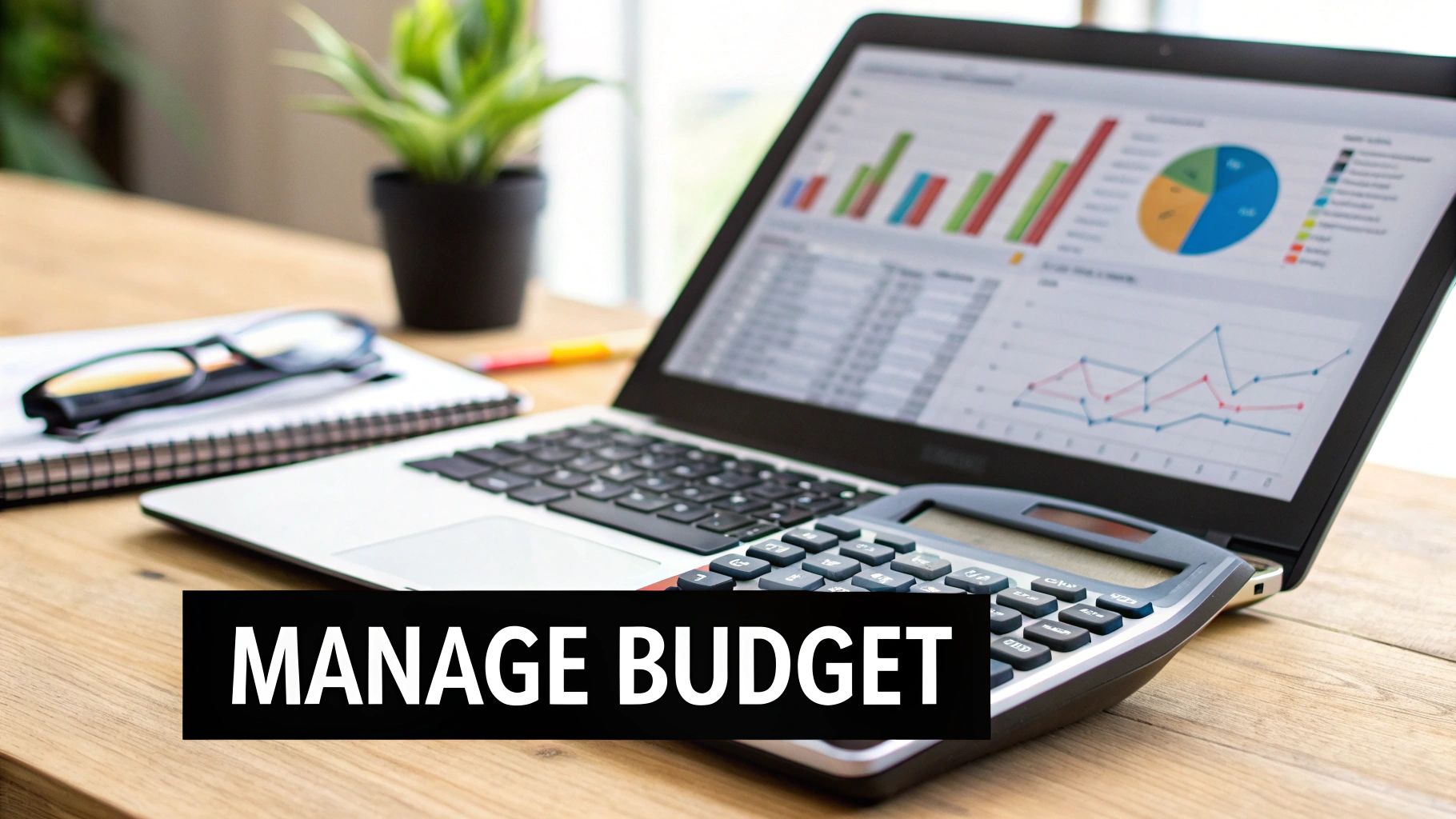PPC Management for Small Business | Boost Your ROI

PPC management for small business means more than just throwing money at ads. It’s about setting clear goals, picking the right places to advertise, and creating sharp, focused campaigns to connect with real customers.
Success isn’t about getting clicks; it’s about turning those clicks into profitable actions for your business.
PPC Management for Small Business: Building Your Foundation for PPC Success
Before you spend your first pound on an ad, you need to build a solid strategic foundation. This isn’t the time to master complex ad platforms. Right now, it’s about defining what success actually looks like for your specific business.
Too many small businesses get caught up chasing vanity metrics like clicks and impressions. Those numbers feel good, but they don’t pay the bills.
Instead, let’s focus on tangible, measurable outcomes. A local plumbing business, for example, might aim for 30 new service quote requests per month. An e-commerce boutique could target a 15% increase in online sales for a new product line. These specific goals transform your ad budget from a blind expense into a targeted investment.
Defining Your Goals and Audience
First things first, let’s move from vague hopes to concrete objectives. What single action do you want someone to take after they click your ad? This could be anything from filling out a contact form to buying a product or downloading a guide. Knowing this one thing helps you shape every single part of your campaign.
Next, you need to get crystal clear on who you’re trying to reach. Creating a simple buyer persona is an incredibly powerful exercise. Imagine a local bookshop trying to promote its online store. Their ideal customer might be “Sarah,” a 35-year-old professional who loves supporting local businesses and reads historical fiction. This simple profile immediately sharpens your ad copy, keyword choices, and audience targeting.
The whole process, from planning to performance, follows a logical flow.

As you can see, clear goal-setting and smart budget allocation are the bedrock of any successful campaign launch and its ongoing monitoring.
Analysing Your Competition (PPC Management for Small Business)
A crucial part of this groundwork is getting a handle on the competitive landscape. You don’t need fancy tools to get started. Just run a simple Google search for your main services or products.
Take a look at who’s already running ads. What are they saying? What offers are they promoting?
Seeing these ads gives you powerful insights into the keywords they’re targeting and the messaging they use to hook customers. Pay close attention to their headlines, their offers, and their calls to action. This is where you’ll spot gaps and find opportunities for your own campaigns.
Key Takeaway: Your initial PPC planning isn’t just an administrative task. It’s the strategic core that determines whether your ad spend will generate a real return or simply disappear.
One of the most critical pieces of this foundation is controlling precisely where your ads show up. Getting to grips with Google Ads keyword match types is non-negotiable. It’s what stops you from wasting your budget on irrelevant searches and ensures you reach customers with genuine intent. For any small business, this control is a cornerstone of effective PPC management.
PPC Management for Small Business: Budgeting Realistically for Maximum Impact

Figuring out your PPC budget can feel like a shot in the dark, but it absolutely doesn’t have to be. For a small business, nailing your PPC management starts with setting a realistic ad spend that’s grounded in your operational reality, not just guesswork. Forget pulling numbers from thin air; the smartest way forward is to start small.
Think of your initial budget not as a tool for making a massive profit, but as an investment in data. Launching a small, controlled test campaign is how you gather crucial intelligence. You’ll find out which keywords actually convert, what ad copy gets a response, and how much a click truly costs in your specific market. This information is gold.
A small, controlled test budget is an investment in knowledge. It prevents you from scaling up a flawed strategy and wasting significant funds down the line. Treat your first month’s spend as tuition for learning what your audience responds to.
This data-first approach is what lets you build a financial model based on real-world performance, not just hopeful assumptions.
Factoring in Total Costs (PPC Management for Small Business)
Remember, your total investment in PPC isn’t just what you pay Google or Meta. A massive, and often overlooked, part of the equation is the cost of expertise, whether that’s a specialist agency or a freelance pro. It’s tempting to try and save cash by managing campaigns yourself, but this is often a false economy. I’ve seen it time and again: wasted ad spend from poorly managed campaigns almost always costs more than professional management fees.
To give you some context, small businesses in the UK operate on a wildly varied spectrum. Many will allocate anywhere from £200 to £5,000 annually on their PPC efforts, a figure that often has to cover both the ad spend itself and any management fees. It’s a realistic starting bracket for local businesses and startups looking to get their foot in the door.
Calculating Your Target CPA
To make your budget genuinely work for you, you need to get your head around your target cost-per-acquisition (CPA). This is simply the maximum amount you can afford to spend to get a new customer while still turning a profit.
Here’s a practical breakdown:
- Define Customer Value: First up, what’s a new customer actually worth to you over their lifetime? A local coffee shop, for instance, might find their average customer has a lifetime value (LTV) of £300 over a year.
- Set Your Margin: Next, what’s your profit margin on that value? If your margin is 25%, you can afford to spend up to £75 to acquire that £300 customer and still be in the black.
- Allocate to Marketing: Finally, decide how much of that allowable cost you can dedicate specifically to PPC. If you decide to allocate 50% of it to this channel, then your target CPA is £37.50.
Knowing this number is a game-changer. It empowers you to make intelligent bidding decisions and measure success with real accuracy. Integrating this kind of calculation into your wider plans is essential, and you can explore more ideas in our guide to marketing strategies for small businesses. This structured approach transforms your budget from a simple expense line into a powerful tool for predictable growth.
PPC Management for Small Business: Building Your First High-Performing Campaign

Alright, you’ve got your goals locked in and a budget you can work with. Now for the exciting part: turning that strategy into a real, live campaign. This is where the theory stops and the hard work of PPC management for your small business truly begins.
The way you structure this first campaign is absolutely critical. Think of it as the foundation of a house – if it’s weak, everything you build on top of it will be unstable.
A classic rookie mistake is to just dump a massive list of keywords into one big, messy ad group. This is a sure-fire way to dilute your message, tank your Quality Score, and end up paying more for fewer clicks. The secret is to think small, specific, and laser-focused.
Organising for Success with Tightly Themed Ad Groups
The real key to a successful PPC setup is creating what we call ‘tightly themed ad groups’. Each ad group should be a small, neat cluster of keywords that are all incredibly similar and share the exact same user intent. This structure is non-negotiable for effective PPC.
Let’s take a boutique bakery as an example. Instead of one huge ad group for “cakes,” which is far too broad, they should break it down into super-specific groups:
- Ad Group 1 (Weddings): “wedding cakes near me,” “custom wedding cake baker,” “wedding cake tasting London.”
- Ad Group 2 (Birthdays): “birthday cake delivery,” “order kids birthday cake,” “next day birthday cake.”
- Ad Group 3 (Vegan): “vegan cupcake box,” “buy vegan cupcakes online,” “local vegan bakery.”
See the difference? This level of detail allows you to write ad copy that speaks directly to what each person is searching for. Someone looking for a “wedding cake” has completely different needs and questions than someone who needs a “birthday cake delivery,” and your ads have to reflect that.
This granular approach is especially vital when you’re just starting out. For more tailored advice, check out our guide on PPC for startups.
Crafting Compelling Ad Copy and Landing Pages (PPC Management for Small Business)
With your ad groups properly structured, you can now write ad copy that actually connects with people. Your headline should feel like an echo of their search query, and the description needs to shout about what makes you special (your unique value proposition) and include a call to action (CTA) they can’t ignore. Think “Order Now for Free Delivery” or “Get a Free Quote Today.”
The final, crucial piece of this puzzle is your landing page. Driving traffic from a super-specific ad to your generic homepage is like throwing your money down the drain. Each ad group must direct users to a dedicated landing page that carries on the conversation your ad started.
Expert Tip: Make sure your landing page headline perfectly matches your ad’s headline. This creates a seamless, reassuring journey for the user, instantly telling them they’re in the right place and dramatically increasing your chances of getting that conversion.
Here in the UK, the small business PPC scene is fierce, so every penny of your budget has to count. A sensible minimum monthly budget usually starts somewhere between £500 and £1,000. This figure makes a lot of sense when you realise that over 85% of consumers research products online before they even think about buying. It just goes to show why having a properly built campaign from day one is essential to getting the best bang for your buck.
Right, let’s talk about the bit that really matters: making sure your PPC spend is actually making you money.
How to Actually Measure and Improve Your ROI

A ‘set it and forget it’ attitude is the fastest way to burn through your precious PPC budget. I’ve seen it happen too many times. Real success in PPC, especially for a small business, comes from constantly keeping an eye on your campaigns and making smart, informed tweaks. It’s all about reading the story your data is telling you so you can make confident decisions that actually drive growth.
This means looking beyond the vanity metrics. Sure, clicks and impressions might look impressive on a report, but they don’t pay the bills. You need to zero in on the key performance indicators (KPIs) that are directly tied to your bottom line.
KPIs That Genuinely Matter
To get a true feel for your campaign’s health, you have to be tracking the right numbers. These are the big three that should be on your radar constantly.
- Conversion Rate: This is the bread and butter. It’s the percentage of people who click your ad and then do what you want them to do (buy something, fill in a form, etc.). A healthy conversion rate tells you that your ad copy and landing page are singing from the same hymn sheet.
- Cost Per Conversion (CPA): This metric cuts straight to the point. It tells you exactly how much you’re spending to get one new customer or lead. You simply divide your total ad spend by the number of conversions. No fluff, just facts.
- Return on Ad Spend (ROAS): This is the ultimate measure of profitability. It calculates how much revenue you’re generating for every pound you put into advertising. A ROAS of 4:1, for example, means you’re making £4 for every £1 you spend. That’s a number you can take to the bank.
Given that Google Ads commands a whopping 93.51% share of the UK’s digital ad market, knowing what ‘good’ looks like is vital. Solid campaigns often hit click-through rates of 4-6% and conversion rates around 3-5%. It’s figures like these that explain why 79% of UK marketers see PPC as so beneficial.
The dashboard you see above is a typical view from Google Analytics, giving a bird’s-eye view of website traffic. These numbers are your launchpad for digging deeper to see which channels are bringing in the valuable actions.
From Data to Actionable Insights (PPC Management for Small Business)
Once you’re tracking these KPIs, you can start making improvements backed by real data, not just gut feelings. See a keyword that’s getting loads of clicks but zero conversions? It’s time to pause it and re-evaluate. Is one ad’s headline clearly outperforming another? Great, double down on what works and create variations of the winner.
The table below breaks down the essential metrics you should be watching. It’s a simple guide to what they mean and what a decent benchmark looks like for a typical UK-based campaign.
Key PPC Metrics to Watch for Your Business
| Metric (KPI) | What It Measures | Good UK Benchmark |
|---|---|---|
| Click-Through Rate (CTR) | The percentage of people who see your ad and click on it. | 4-6% (Search) |
| Conversion Rate | The percentage of clicks that result in a desired action (e.g., a sale or lead). | 3-5% |
| Cost Per Conversion (CPA) | The average cost you pay for each conversion. | Varies hugely by industry |
| Return on Ad Spend (ROAS) | The total revenue generated for every pound spent on ads. | Aim for 4:1 or higher |
| Quality Score | Google’s rating of the quality and relevance of your keywords and ads. | 7/10 or higher |
Tracking these will give you a much clearer picture of what’s working and, more importantly, what isn’t.
Key Takeaway: Don’t be afraid to test and fail. Every pound spent on a low-performing ad is an investment in learning what doesn’t work, which is just as valuable as knowing what does.
A powerful technique for this is A/B testing. This is where you create two slightly different versions of an ad or landing page to see which one gets better results. You could test things like:
- Different Headlines: Try posing a question versus making a bold statement.
- Varying Calls-to-Action: Compare a direct “Shop Now” with a softer “Explore the Collection.”
- New Landing Page Layouts: Pit a short-form page against a long-form one, or a video against a static image.
These small, incremental changes can add up to some seriously significant wins over time. Constantly refining your approach based on real performance data is the absolute core of effective PPC management. For a deeper look at this, our guide on how to improve Google Ads performance offers more specific tactics you can put into action today.
PPC Management for Small Business: Smart Ways to Scale Your PPC Campaigns
So, your campaigns are turning a consistent profit. Fantastic. The first instinct is often to just crank up the budget across the board and watch the money roll in. If only it were that simple.
Smart scaling isn’t about just spending more; it’s about investing that cash where it will work the hardest for you. It’s the difference between just getting bigger and actually getting better. Effective PPC management is all about intelligent growth.
Your first port of call should always be remarketing. Think about it – how many people browse your site, maybe even add something to their basket, and then just… leave? It’s a lot. Remarketing gives you a second chance to get in front of these people, individuals who have already raised their hand and shown an interest.
These campaigns are often ridiculously cost-effective because you’re not shouting into the void. You’re talking to a warm, pre-qualified audience. You can get really clever here, too, by segmenting your lists. Show one set of ads to basket abandoners and a completely different, softer message to people who only read a blog post.
Expanding Beyond Search Ads
Once your Search campaigns are humming along nicely, it’s time to branch out. Don’t put all your eggs in one basket. Different platforms let you catch customers at various stages of their buying journey, and a truly scaled-up strategy needs them all.
- Google Shopping: For any e-commerce business, this is a non-negotiable. Shopping ads are visual, they dominate the top of the search results, and they often pull in higher conversion rates than their text-based cousins.
- Display Campaigns: These are the image-based ads that follow you around the internet. They’re absolutely brilliant for building brand awareness and for super-charging your remarketing efforts, keeping you front-of-mind.
- Performance Max (PMax): This is Google’s all-in-one, machine-learning-powered beast. You feed it the creative, and it runs your ads across every single Google channel (YouTube, Display, Search, you name it) to hunt down converting customers wherever they might be hiding.
This multi-channel approach is genuinely what separates the amateurs from the pros. For a much deeper look into this, our guide on maximising ROI with effective PPC management strategies has some great tactics specifically for UK SMEs.
Refining Your Targeting with Negative Keywords (PPC Management for Small Business)
Scaling isn’t just about adding more; it’s also about aggressively cutting away the fat. This is where a rock-solid negative keyword list becomes your secret weapon. You absolutely must get into the habit of regularly checking your Search Terms Report. It shows you the exact, real-life queries that triggered your ads.
You’re looking for the irrelevant stuff that’s eating your budget. For example, if you sell premium, brand-new office furniture, search terms like “free,” “cheap,” and “second-hand” are just wasting your money. Every single irrelevant click you block frees up that cash to be spent on keywords that actually lead to sales.
Expert Tip: Always think about the user’s intent. If you sell a product but don’t offer a repair service, adding words like “repair,” “fix,” and “service” to your negative list will instantly improve the quality of your leads and make your ad spend far more efficient.
As your campaigns grow, trying to manage every single bid by hand becomes impossible. It’s just not a good use of your time. This is where automated bidding strategies like Target CPA (Cost Per Acquisition) or Target ROAS (Return On Ad Spend) really earn their keep. You feed Google’s algorithm your conversion data and your goals, and you let it do the heavy lifting of setting bids in real-time. This frees you up to think about the bigger picture and overall strategy.
To tie everything together, using a powerful marketing automation API can connect all your different marketing channels. This ensures your scaling efforts are perfectly coordinated, from PPC to email to social. This level of integration is what truly defines a business that scales intelligently.
Got Questions About PPC? We’ve Got Answers.
Diving into pay-per-click advertising for the first time can feel like a massive leap of faith. As a small business owner, you’re probably juggling a dozen questions about how it all works and whether it’s even right for you. We hear the same worries all the time, so let’s tackle them head-on and clear the air.
How Much Does PPC Actually Cost?
This is usually the first question on everyone’s mind. The honest answer? It depends. Your industry, how competitive your keywords are, and where you’re targeting all play a part.
The good news is you have 100% control over your budget. You set the daily limits, so you’ll never wake up to a surprise bill. A modest test budget is often the smartest way to start, letting you dip your toes in the water without a huge commitment.
How Much Time Does It Take to Manage? (PPC Management for Small Business)
Another big one. Let’s be clear: effective PPC isn’t a “set it and forget it” deal. It needs regular attention—at least a few times a week, if not daily—to check performance, tweak bids, and fine-tune your targeting.
This hands-on management is exactly what stops you from wasting money and helps you drive real, measurable results.
Do I Need to Hire a PPC Agency?
This is a major crossroads for many businesses. Can you manage PPC yourself? Of course. Platforms like Google Ads are built for self-service. But the learning curve is steep, and a few wrong clicks can get expensive, fast.
While around 47% of small business owners handle their own marketing, it doesn’t always mean it’s the most efficient path.
Hiring a specialist PPC agency gives you instant access to years of experience. An expert already knows the ins and outs of bidding, keyword research, and conversion optimisation. Yes, it’s an added cost, but it often pays for itself by helping you sidestep common mistakes and delivering a much stronger return, much sooner.
It’s not just about the agency fee versus your ad spend. The real calculation should include the cost of your own time and the potential revenue you’d lose from a poorly run campaign. Sometimes, hiring an expert is the most financially sound decision you can make.
PPC vs SEO: Which One is Better for Me? (PPC Management for Small Business)
Business owners often feel they have to choose between PPC and Search Engine Optimisation (SEO). The truth is, they work brilliantly together. Think of it this way: PPC delivers speed and immediate data, while SEO builds your long-term, organic foundation.
If you need results now—maybe for a seasonal promotion or a new service launch—PPC is your go-to. You can switch on a campaign and see traffic in a matter of hours.
If your priority is building a sustainable online presence over time with a more constrained budget, starting with local SEO might be the better first step. But ultimately, a combined strategy is the holy grail. It lets you dominate both the paid and organic sections of search results, covering all your bases and leaving no room for your competitors.
Feeling a bit overwhelmed by the complexities of PPC? You don’t have to figure it all out on your own. The team at PPC Geeks specialises in creating data-driven campaigns that deliver tangible results for UK businesses just like yours.
If you’re ready to boost your ROI and get your time back, get in touch for a free, in-depth PPC audit today.
Author
Search Blog
Free PPC Audit
Subscribe to our Newsletter
The Voices of Our Success: Your Words, Our Pride
Don't just take our word for it. With over 100+ five-star reviews, we let our work-and our satisfied clients-speak for us.
"We have been working with PPC Geeks for around 6 months and have found Mark and the team to be very impressive. Having worked with a few companies in this and similar sectors, I rate PPC Geeks as the strongest I have come across. They have taken time to understand our business, our market and competitors and supported us to devise a strategy to generate business. I value the expertise Mark and his team provide and trust them to make the best recommendations for the long-term."
~ Just Go, Alasdair Anderson
